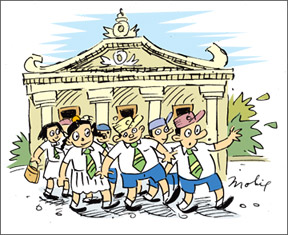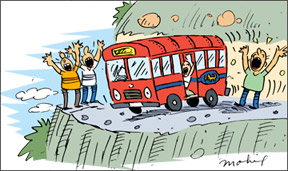|

by R. S. Karunaratne
When to use 'after' and 'afterwards'
|

The schoolchildren left just after watching the drama. |
'After' is usually used with a noun phrase referring to time.
After a while, she got used to the new work routine.
I'm going to start a new course of studies after the holidays.
After spending two weeks in Malaysia, I felt homesick.
'After' is used to post modify a noun referring to time. This is very
common in spoken English.
Shall we meet the week after as I am busy next week.
The day after Sunday is supposed to be auspicious.
'After' is sometimes pre modified by another adverb.
Soon after the examination, she left for France.
I thought of doing something different straight after leaving school.
Shortly after the robbery, there was an explosion.
In informal speech, 'after' can replace 'later'.
Now I'm reminded of a funny thing that happened to me. Anyway, I'll
tell you everything after.
When there is no pre modifying adverb, 'afterwards' is preferable to
'after'.
Shyama identified the snatch thief. Afterwards, she phoned the
police.
A violent storm sped past the sleepy village, but afterwards
everything was quiet.
'Afterwards' can be pre modified by another adverb.
The bus came to an abrupt halt and the people started screaming
almost immediately afterwards.
Police arrived on the scene shortly afterwards the accident.
A few days afterwards the army captured the terrorist leader, we
heaved a sigh of relief.
In formal English 'after' is followed by a verb in the '-ing' form.
After capturing the wild elephant, villagers were waiting for the
Wildlife Department officials.
After obtaining a first class degree in law, Sarath became a
lecturer.
'After all' when used as a conjunction means 'besides'.
|

The bus came to an abrupt halt and the people started screaming
almost immediately afterwards. |
I don't mind the price. After all , I look for quality.
We use 'after' with a present tense to talk about the future.
I'll phone you after I arrive in London.
It is a common mistake to use 'after all' to mean 'finally'.
After sightseeing they finally returned to their hotel.
As a preposition 'after' is used when a particular time or event has
happened.
After the war many people left the country.
'Just after' means 'a short time after'.
The schoolchildren left just after watching the drama.
If several things happen 'one after another', each thing happens
immediately after the previous one. There were several loud explosions,
one after another.
Current English usage
English being a living language is subject to change from time to
time. Here is a guide to be familiar with such changes.
1. ecstasy
This is a frequently misspelt word. Note the 'es' and 'as'
combination. It means 'great joy'. Ecstasy, spelt with a capital E, is
the name of a non-medicinal drug.
2. e.g.
This is an abbreviation of the Latin phrase exempli gratia, meaning
'for example'. Unlike some abbreviations, it has full stops.
3. egoist and egotist
Egoist is a person intent on self-interest. He is a selfish person.
Egotist is a person who is totally self-centred and obsessed with his
own concerns. An egotist, for instance, always talks about himself.
4. either
Use 'either' only when you are referring to two people or things. I
haven't met either of parents for some time. In 'either... or'
construction, a singular verb is used if both parts of the construction
are singular. Either John or Sam has to do it. If both parts are plural,
the verb is plural. Either his parents or his friends have to support
him. If the construction involves a combination of singular and plural,
the verb should agree with the subject that is nearer it. Either his
friend or his parents have to support him.
5. elder and older
Use elder only for people. We normally use it to indicate family
relationship. My elder brother died some years ago. Elder, as a noun,
suggests age and experience. Respect your elders. Older is used for
people and things. This town has many old buildings. Elderly means
'quite old'. Many elderly people work in this company.
6. elemental and elementary
Elemental means 'like the elements', such as the forces of nature
which are powerful and uncontrollable. Life is an elemental essence.
Elementary means 'basic'. I had to sit an elementary test in maths.
7. embarrass
Note the 'rr' and 'ss' combination. It means to cause to feel
self-conscious, confused or ashamed'. His questions embarrassed her.
8. emigrant and immigrant
Emigrant is a person who leaves his native country to live elsewhere.
Immigrant is a person who arrives to live in another country having left
his motherland. Both words can apply to the same person, viewed from
different points of view. |

